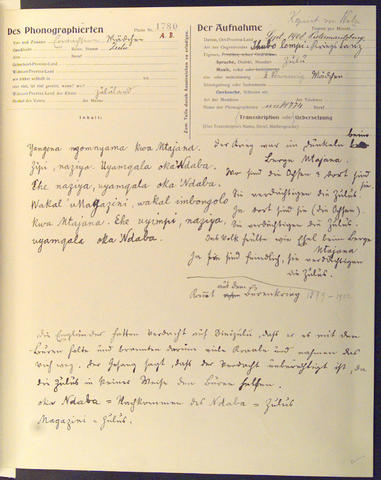Zona do título e menção de responsabilidade
Título próprio
Ihubo lempi: war-dance [song] Three-part singing by three grown-up girls, handwritten protocol
Designação geral do material
- Documento textual
Título paralelo
Outra informação do título
Título e menções de responsabilidade
Notas ao título
- Fonte do título próprio: ÖAW
Nível de descrição
Item
Entidade detentora
Código de referência
Zona de edição
Menção de edição
Menção de responsabilidade da edição
Zona de detalhes específicos de materiais
Menção da escala (cartográfica)
Menção da projecção (cartográfica)
Menção das coordenadas (cartográfico)
Menção da escala (arquitectura)
Autoridade emissora e denominação (filatélica)
Zona de datas de criação
Data(s)
-
2016 - (Online curation)
-
c.1908 (Making)
Zona de descrição física
Descrição física
Zona dos editores das publicações
Título próprio do recurso continuado
Títulos paralelos das publicações do editor
Outra informação do título das publicações do editor
Menção de responsabilidade relativa ao editor do recurso contínuo
Numeração das publicações do editor
Nota sobre as publicações do editor
Zona da descrição do arquivo
História custodial
Âmbito e conteúdo
[Source - Carolyn Hamilton for FHYA, 2019, using ÖAW materials: Mayr’s note-taking was sporadic. In his protocols he occasionally gives very few details about some informants, while with others he is quite meticulous. Usually, informants without a first or family name, or informants with names that sound foreign to us, such as Nogwaja, Pakati, Tshingwayo, and Nondhleko, reveal that the person was not a converted Christian, but still a traditional Zulu in the sense that the person adhered to long-established Zulu custom; European-style names such as Frida Kunene and Maria Gertrud(e) Mkize, on the other hand, indicate that these people were Christians. Baptisms were considered successes in the missionary's attempt to "win souls" for the church priorities for the mission. Thus, the baptism registers give some details about those who had decided to change their religion. Typically, when a person was baptised, he or she would take a European name. These names were usually those of European patrons: for example, Fr. Mayr baptised the five-week-old Msomi, Maria Coudenhove, which was the name of the newborn girl's European sponsor. Mlambo, a young man, received the name of his "uncle" or European patron, Franz Rohrmoser (cf. Gütl 2004: 77, 89, 128). The age of the people to be baptised varied from newborn children to elderly people; since most of the latter did not know their birthdays, Mayr was only able to take down estimates of their age into his register (cf. Gütl 2004: 99-100).]
Zona das notas
Condição física
Fonte imediata de aquisição
Organização
Idioma do material
Script do material
Localização de originais
Disponibilidade de outros formatos
Restrições de acesso
Termos que regulam o uso, reprodução e publicação
Creative Commons License: CC BY-NC-ND
https://creativecommons.org/licenses/by-nc-nd/3.0/
Unless otherwise stated the copyright of all material on the FHYA resides with the contributing institution/custodian.
Instrumentos de descrição
Materiais associados
Ingressos adicionais
Nota geral
Attributions and conjectures
[Source - The Collection of Father Franz Mayr Zulu Recordings 1908, CD booklet, 2006: For some of his recordings, Father Franz Mayr limited his notes on the interlocutors to "grown up (Zulu) girls".]
Identificador(es) alternativo(s)
Zona do número normalizado
Número normalizado
Pontos de acesso
Pontos de acesso - Assuntos
Pontos de acesso - Locais
Pontos de acesso - Nomes
- Five Hundred Year Archive (FHYA) ()
- Austrian Academy of Sciences (ÖAW) (Publicação)
- Reverend Father Franz Mayr (Coleção)
- No attribution ()



Material contributed by members of the public
Building an archive is a collective endeavour. Please help us grow the FHYA knowledge base.
If you want to add information to this page you can insert a hyperlink, add files and/or text to the box below.
In the case of material relevant to the FHYA as a whole please upload information HERE.
The FHYA does not vet this material but reserves the right to remove anything deemed to be racist, homophobic, sexist or otherwise offensive. Everything on the FHYA is licensed under a Creative Commons CC BY-NC-ND licence.
To make a contribution you must be a registered user. To register an account, click here. Note that after registration you will not be automatically redirected to this page.
If you have already registered but are not logged in, log in here.